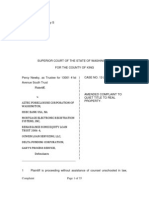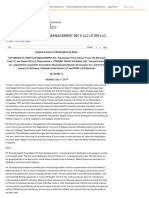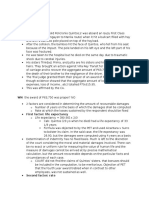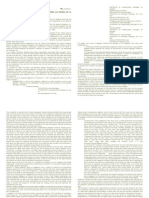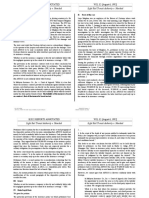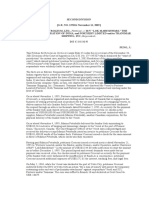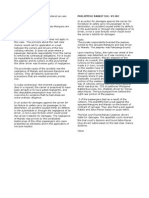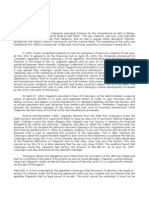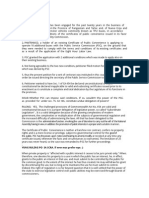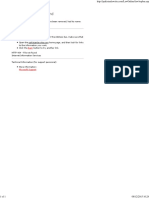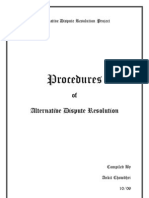1-US Vs Tan Piaco
1-US Vs Tan Piaco
Uploaded by
Vicelle QuilantangCopyright:
Available Formats
1-US Vs Tan Piaco
1-US Vs Tan Piaco
Uploaded by
Vicelle QuilantangOriginal Description:
Original Title
Copyright
Available Formats
Share this document
Did you find this document useful?
Is this content inappropriate?
Copyright:
Available Formats
1-US Vs Tan Piaco
1-US Vs Tan Piaco
Uploaded by
Vicelle QuilantangCopyright:
Available Formats
US vs.
Tan Piaco
Facts:
Defendants were charged with a violation of the Public Utility Law (Act No. 2307 as amended by Acts Nos. 2362
and 2694), in that they were operating a public utility without permission from the Public Utility Commissioner.
Upon the complain presented each of said defendants were arrested and brought to trial. After hearing the evidence
the Honorable Cayetano Lukban, judge, found that the evidence was insufficient to support the charges against
Ventura Estuya, Pedro Homeres, Maximino Galsa and Emilio Leopando, and absolved them from all liability under
the complaint and discharged them from all liability under the complaint and discharged them from the custody of
the law. The lower court found the defendant Tan Piaco guilty of the crime charged in the complaint and sentence
him to pay a fine of P100, and, in case of insolvency, to suffer subsidiary imprisonment, and to pay one-fifth part of
the costs. From that sentence Tan Piaco appealed to the Supreme Court.
Issue: Whether or not Tan Piaco operated a public utility for public use
Ruling:
Section 14 of Act No. 2307, as amended by section 9 of Act No. 2694, provides that: "The Public Utility
Commission or Commissioners shall have general supervision and regulation of, jurisdiction and control over, all
public utilities. . . . The term 'public utility' is hereby defined to include every individual, copartnership, association,
corporation or joint stock company, etc., etc., that now or hereafter may own, operate, managed, or control any
common carrier, railroad, street railway, etc., etc., engaged in the transportation of passengers, cargo, etc., etc., for
public use."
Under the provisions of said section, two things are necessary: (a) The individual, copartnership, etc., etc., must be a
public utility; and (b) the business in which such individual, copartnership, etc. etc., is engaged must be for public
use. So long as the individual or copartnership, etc., etc., is engaged in a purely private enterprise, without
attempting to render service to all who may apply, he can in no sense be considered a public utility, for public use.
"Public use" means the same as "use by the public." The essential feature of the public use is that it is not confined
to privilege individuals, but is open to the indefinite public. It is this indefinite or unrestricted quality that gives it its
public character. In determining whether a use is public, we must look not only the character of the business to be
done, but also to the proposed mode of doing it. If the use is merely optional with the owners, or the public benefit is
merely incidental, it is not a public use, authorizing the exercise of the jurisdiction of the public utility commission.
There must be, in general, a right which the law compels the power to give to the general public. It is not enough
that the general prosperity of the public is promoted. Public use is not synonymous with public interest. The true
criterion by which to judge of the character of the use is whether the public may enjoy it by right or only by
permission.
For all of the foregoing reasons, we agree with the Attorney-General that the appellant was not operating a public
utility, for public use, and was not, therefore, subject to the jurisdiction of the Public Utility Commission.
You might also like
- Crystal White Southfield Police LawsuitDocument14 pagesCrystal White Southfield Police LawsuitWDIV/ClickOnDetroitNo ratings yet
- Quiet TitleDocument35 pagesQuiet Titleboathook70% (10)
- Quiz-Section 59 To 74 CorporationDocument4 pagesQuiz-Section 59 To 74 CorporationjasslyneNo ratings yet
- First Philippine Industrial Corporation vs. CA, 300 SCRA 661Document5 pagesFirst Philippine Industrial Corporation vs. CA, 300 SCRA 661Michelle CatadmanNo ratings yet
- 9 Spouses Cruz vs. Sun Holidays, Inc., G.R. No. 186312Document15 pages9 Spouses Cruz vs. Sun Holidays, Inc., G.R. No. 186312blessaraynesNo ratings yet
- Landti DigestDocument5 pagesLandti DigestRikka ReyesNo ratings yet
- NIL CasesDocument51 pagesNIL CasesLope Nam-iNo ratings yet
- Future Select Vs TremontDocument8 pagesFuture Select Vs TremontJay TabuzoNo ratings yet
- Ganzon Vs - Court of AppealsDocument2 pagesGanzon Vs - Court of AppealsKfMaeAseronNo ratings yet
- Canonizado V Aguirre CaseDocument10 pagesCanonizado V Aguirre CaseJoshua LanzonNo ratings yet
- FRANCISCO JARQUE Vs Smith Bell (Rule 130 Section 15)Document3 pagesFRANCISCO JARQUE Vs Smith Bell (Rule 130 Section 15)Jules VosotrosNo ratings yet
- TRANSPO - San Pablo V Pantranco (GR L-61461)Document3 pagesTRANSPO - San Pablo V Pantranco (GR L-61461)Loreen DanaoNo ratings yet
- CBC Vs COA G.R. No. 79956Document2 pagesCBC Vs COA G.R. No. 79956dave bermilNo ratings yet
- Pedro de Guzman v. Court of AppealsDocument1 pagePedro de Guzman v. Court of AppealsDianne Bernadeth Cos-agonNo ratings yet
- Bienvenido Gelisan Vs AldayDocument2 pagesBienvenido Gelisan Vs AldayTeoti Navarro ReyesNo ratings yet
- Asian Terminals Vs Simon EnterprisesDocument4 pagesAsian Terminals Vs Simon EnterprisesashlawskulNo ratings yet
- Wildvalley v. Court of Appeals, 342 SCRA 213Document2 pagesWildvalley v. Court of Appeals, 342 SCRA 213BenedictTanNo ratings yet
- Magellan Marketing Mfg. Corp. v. Court of Appeals G.R. No. 95529 August 22, 1991Document2 pagesMagellan Marketing Mfg. Corp. v. Court of Appeals G.R. No. 95529 August 22, 1991Mariline LeeNo ratings yet
- Fisher v. Yangco Steamship CoDocument3 pagesFisher v. Yangco Steamship CosakaskajbNo ratings yet
- 11 Loadstar Shipping Co. vs. CA, 315 SCRA 339Document13 pages11 Loadstar Shipping Co. vs. CA, 315 SCRA 339blessaraynesNo ratings yet
- Asilo v. Bombasi ReportDocument3 pagesAsilo v. Bombasi ReportG Ant MgdNo ratings yet
- de Guerero V Madrigal ShippingDocument1 pagede Guerero V Madrigal ShippingeieipayadNo ratings yet
- Torts CasesDocument45 pagesTorts CasesMary Therese Gabrielle EstiokoNo ratings yet
- 3 Kapalaran Bus Line Vs CoronadoDocument9 pages3 Kapalaran Bus Line Vs CoronadoGillian Alexis ColegadoNo ratings yet
- PLJ Volume 79 Number 2 - 03 - Artemio v. Panganiban - Judicial Activism in The PhilippinesDocument16 pagesPLJ Volume 79 Number 2 - 03 - Artemio v. Panganiban - Judicial Activism in The PhilippinesKris Antonnete DaleonNo ratings yet
- Barrios vs. Carlos A. Go Thong & Company G.R. No. L-17192 March 30, 1963Document2 pagesBarrios vs. Carlos A. Go Thong & Company G.R. No. L-17192 March 30, 1963Chloe Sy GalitaNo ratings yet
- Caltex (Philippines), Inc. vs. Sulpicio Lines, IncDocument2 pagesCaltex (Philippines), Inc. vs. Sulpicio Lines, IncJefferson MortelNo ratings yet
- VIlla Rey V CADocument2 pagesVIlla Rey V CACelest AtasNo ratings yet
- HEIRS OF JOSE MARCIAL K. OCHOA Namely: RUBY B. OCHOA, MICAELA B. OCHOA and JOMAR B. OCHOA v. G&S TRANSPORT CORPORATIONDocument2 pagesHEIRS OF JOSE MARCIAL K. OCHOA Namely: RUBY B. OCHOA, MICAELA B. OCHOA and JOMAR B. OCHOA v. G&S TRANSPORT CORPORATIONGieldan BulalacaoNo ratings yet
- Osea Vs MalayaDocument3 pagesOsea Vs MalayaJoan PabloNo ratings yet
- First Philippine Industrial Corp. vs. CA) Case: Jose Mendoza vs. Philippine Airlines IncDocument34 pagesFirst Philippine Industrial Corp. vs. CA) Case: Jose Mendoza vs. Philippine Airlines IncApureelRoseNo ratings yet
- Transpo 26 44Document48 pagesTranspo 26 44Cyrus Santos MendozaNo ratings yet
- GR 244587 2023Document22 pagesGR 244587 2023marvinnino888No ratings yet
- Luzon Stevedoring Corporation v. CTA and CIRDocument1 pageLuzon Stevedoring Corporation v. CTA and CIRtemporiariNo ratings yet
- Vda de Maglana v. ConsolacionDocument4 pagesVda de Maglana v. ConsolacionJulia Camille RealNo ratings yet
- Police Power and Eminent Domain Case DigestDocument10 pagesPolice Power and Eminent Domain Case DigestWindy Sacki Capuyan0% (1)
- Crescent Petroleum, Ltd. v. MV Lok Maheshwari, Et Al G.R. No. 155014Document8 pagesCrescent Petroleum, Ltd. v. MV Lok Maheshwari, Et Al G.R. No. 155014FeBrluadoNo ratings yet
- SPOUSES TANGLAO vs. SPOUSES PARUNGAO - Case DigestsDocument3 pagesSPOUSES TANGLAO vs. SPOUSES PARUNGAO - Case DigestsJetJuárezNo ratings yet
- RP vs. LualhatiDocument4 pagesRP vs. LualhatijiggerNo ratings yet
- A.10. Calibo Vs CADocument2 pagesA.10. Calibo Vs CAeizNo ratings yet
- Everett Steamship Vs Ca FactsDocument20 pagesEverett Steamship Vs Ca FactsLorenz Allan GatpolintanNo ratings yet
- Transpo Phil Rabbit Vs IacDocument1 pageTranspo Phil Rabbit Vs IacsdysangcoNo ratings yet
- Ludo v. BinamiraDocument2 pagesLudo v. BinamiraCocoyPangilinanNo ratings yet
- Consuegra Vs GSIS DigestDocument2 pagesConsuegra Vs GSIS DigestEmmanuel OrtegaNo ratings yet
- Coleongco Vs ClaparolsDocument2 pagesColeongco Vs ClaparolsMichael C. PayumoNo ratings yet
- Unsworth Vs CADocument3 pagesUnsworth Vs CAAnonymous 5MiN6I78I0No ratings yet
- TRANSPO - 85. Yangco vs. LasernaDocument1 pageTRANSPO - 85. Yangco vs. LasernaJamaica ManaligodNo ratings yet
- Marbury Vs Madison 5 US 137 (1803)Document10 pagesMarbury Vs Madison 5 US 137 (1803)Christine ErnoNo ratings yet
- Gercio V. Sun Life Assurance of CanadaDocument1 pageGercio V. Sun Life Assurance of CanadaPraisah Marjorey PicotNo ratings yet
- ESTRELLITA M. BASCOS vs. COURT OF APPEALS and RODOLFO A. CIPRIANODocument2 pagesESTRELLITA M. BASCOS vs. COURT OF APPEALS and RODOLFO A. CIPRIANOShine Dawn InfanteNo ratings yet
- Admin Digest 2Document10 pagesAdmin Digest 2rheyneNo ratings yet
- Suntay vs. Suntay FactsDocument2 pagesSuntay vs. Suntay FactsAQAANo ratings yet
- Olsen & Co. v. AldaneseDocument3 pagesOlsen & Co. v. AldaneseNikki Malferrari100% (1)
- Angeles City vs. Angeles City Electric Corp.Document10 pagesAngeles City vs. Angeles City Electric Corp.Sharmen Dizon GalleneroNo ratings yet
- Evangelista Vs JarencioDocument2 pagesEvangelista Vs JarenciojaneNo ratings yet
- De Guia vs. Comelec G.R. No. 104712Document3 pagesDe Guia vs. Comelec G.R. No. 104712Gendale Am-isNo ratings yet
- Aprueba V GanzonDocument4 pagesAprueba V GanzonLou StellarNo ratings yet
- Pantranco V PSCDocument2 pagesPantranco V PSCKaren AbellaNo ratings yet
- Lu Do v. BinamiraDocument2 pagesLu Do v. Binamirargtan3No ratings yet
- Lopez Vs PanamDocument2 pagesLopez Vs PanamMaria Cecilia OlivaNo ratings yet
- 31 PNB v. CADocument3 pages31 PNB v. CAMoira SarmientoNo ratings yet
- Us Vs Tan PiacoDocument2 pagesUs Vs Tan PiacocolanganloradelleNo ratings yet
- US V Tan PiacoDocument2 pagesUS V Tan PiacoEva TrinidadNo ratings yet
- IPRA Law - Case DigestDocument1 pageIPRA Law - Case DigestVicelle QuilantangNo ratings yet
- RPC - TITLE IV - Cases FULL TEXTDocument90 pagesRPC - TITLE IV - Cases FULL TEXTVicelle QuilantangNo ratings yet
- Avelino Vs CirDocument2 pagesAvelino Vs CirVicelle QuilantangNo ratings yet
- Hernandez Et AlDocument2 pagesHernandez Et AlVicelle QuilantangNo ratings yet
- Notes - Domestic Workers ActDocument4 pagesNotes - Domestic Workers ActVicelle QuilantangNo ratings yet
- Legal MaximsDocument2 pagesLegal MaximsVicelle QuilantangNo ratings yet
- 14.08.01 DelNero EPDocument3 pages14.08.01 DelNero EPjbrodkin2000No ratings yet
- Verification Roll: Surname NameDocument3 pagesVerification Roll: Surname NameSoumen JanaNo ratings yet
- Philippine Fisheries Development Authority v. CADocument5 pagesPhilippine Fisheries Development Authority v. CAAngeline LimpiadaNo ratings yet
- البحث ص245 العلمي مسعود حسين 2018Document383 pagesالبحث ص245 العلمي مسعود حسين 2018bassel123.nnNo ratings yet
- Peltan vs. CADocument2 pagesPeltan vs. CAcharmdelmoNo ratings yet
- CasesDocument38 pagesCasesTey TorrenteNo ratings yet
- Ulep V Legal ClinicDocument2 pagesUlep V Legal ClinicsupernanayNo ratings yet
- Murder To Homicide - 11172014Document10 pagesMurder To Homicide - 11172014alwayskeepthefaith8No ratings yet
- Anti - Money Laundering Act: RA No. 9160, As Amended by RA No. 10167 and RA No. 10365Document43 pagesAnti - Money Laundering Act: RA No. 9160, As Amended by RA No. 10167 and RA No. 10365Chincel G. ANINo ratings yet
- V CasesDocument55 pagesV Casesdivine venturaNo ratings yet
- Guingon v. Del Monte, 1967Document3 pagesGuingon v. Del Monte, 1967Randy SiosonNo ratings yet
- United States Court of Appeals, Fourth CircuitDocument2 pagesUnited States Court of Appeals, Fourth CircuitScribd Government DocsNo ratings yet
- Dimaguila Vs MonteiroDocument9 pagesDimaguila Vs MonteiroAnonymous DsZxyFgRJNo ratings yet
- MC127 Media Law Case Digest (Item #4)Document7 pagesMC127 Media Law Case Digest (Item #4)Sandra Patricia PalileoNo ratings yet
- Whitney Bros. Co. v. David C. Sprafkin and Joan Barenholtz, Trustees of The Bernard M. Barenholtz Trust, 3 F.3d 530, 1st Cir. (1993)Document10 pagesWhitney Bros. Co. v. David C. Sprafkin and Joan Barenholtz, Trustees of The Bernard M. Barenholtz Trust, 3 F.3d 530, 1st Cir. (1993)Scribd Government DocsNo ratings yet
- 2015 SCMR 1544Document11 pages2015 SCMR 1544Abdul Majeed NisarNo ratings yet
- Estacode 2019Document1,043 pagesEstacode 2019Abubakar Zubair100% (4)
- Procedures of Alternate Dispute ResolutionDocument30 pagesProcedures of Alternate Dispute Resolutionankit_chowdhri80% (5)
- Bogacki v. InsertDocument2 pagesBogacki v. InsertPepper PottsNo ratings yet
- Washlefske v. Winston, 4th Cir. (2000)Document12 pagesWashlefske v. Winston, 4th Cir. (2000)Scribd Government DocsNo ratings yet
- DK Basu Vs State of West Bengal (1996)Document2 pagesDK Basu Vs State of West Bengal (1996)Subhayu PatiNo ratings yet
- Crba-Checklist April2018 PDFDocument4 pagesCrba-Checklist April2018 PDFAndrew TorresNo ratings yet
- International Hardwood v. UPDocument8 pagesInternational Hardwood v. UPReal TaberneroNo ratings yet
- Moot ProblemDocument6 pagesMoot ProblemaakankshaNo ratings yet
- Petitioner Respondents Mariano R. Abad The Solicitor GeneralDocument8 pagesPetitioner Respondents Mariano R. Abad The Solicitor GeneralLorelei B RecuencoNo ratings yet
- CITIBANK Vs SabenianoDocument5 pagesCITIBANK Vs SabenianoJSNo ratings yet
- Vigil v. Naylor, 65 U.S. 208 (1861)Document5 pagesVigil v. Naylor, 65 U.S. 208 (1861)Scribd Government DocsNo ratings yet

